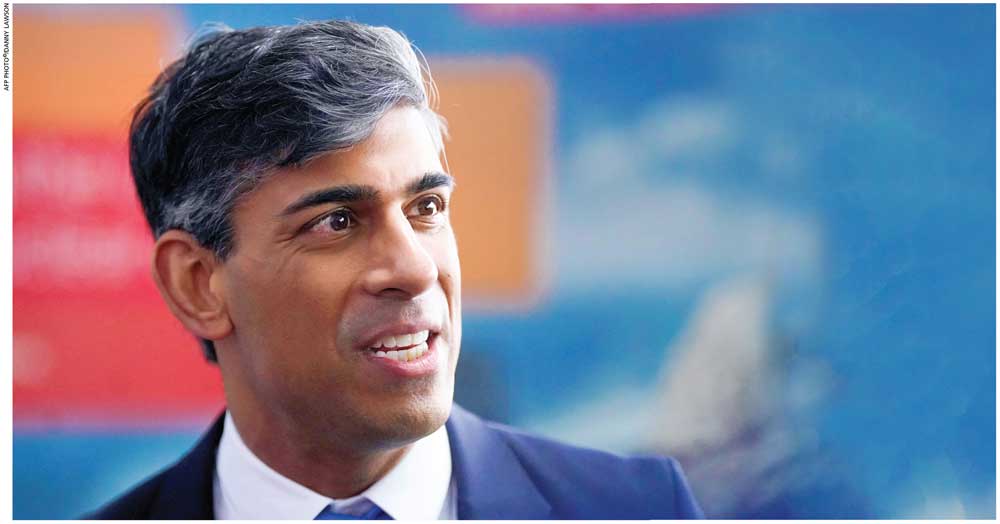UK ELECTIONS
WHO WILL WARM THE GOVERNMENT BENCHES?
Saro Thiruppathy reports on the predictions being made in the media about the possible outcome of the forthcoming general elections in the UK

To say that the election process in the UK is complicated would be an understatement; but one thing is crystal clear – the Conservative Party (commonly and collectively known as the ‘Tories’) has been in the driving seat since 2010 with David Cameron as prime minister at the time.
TORY RULE Though there have been only three general elections (in 2010, 2015 and 2019) over the past 14 years, many more prime ministers have served during this time.
Cameron was elected at the general elections held in 2010 and 2015. And then, following the Brexit referendum to leave the EU, he resigned and was replaced by Theresa May. She was appointed through a Conservative Party leadership election.
In July 2019, May stepped down; and again, instead of calling general elections, the Conservative Party leadership appointed the former Mayor of London Boris Johnson to the post of prime minister.
BREXIT 2020 In December 2019, Johnson called general elections, and the Tories enjoyed a landslide victory with a majority of 80 seats in parliament.
He was seeking a mandate to formally implement ‘exit day’ and withdraw the UK from the EU on 31 January 2020, and repeal the European Communities Act of 1972, which would end any hope of remaining in the European Union.
However, politics is far stranger than fiction; and suddenly, the man who oversaw Brexit and managed the COVID-19 crisis announced he was resigning from his post as the UK’s premier.
This followed a mass revolt by members of his cabinet due to a slew of scandals including ‘Partygate’ and favours granted to Tory members for the supply of personal protective equipment (PPE) during COVID-19 among others.
Johnson was replaced by Liz Truss through yet another Tory Party leadership poll. She was a spectacular failure and lasted only 49 days in office, having nearly sent Britain to the poorhouse.
Next in line was Rishi Sunak, the Chancellor of the Exchequer in Johnson’s cabinet. Johnson’s decision to quit together with his predecessor Sajid Javid preceded a stack of resignation letters that landed on the prime minister’s desk.
Sunak was also appointed to the post of prime minister through a Tory leadership election. He is therefore the fourth premier to enter No. 10 Downing Street without being elected to office through general elections.
2024 ELECTIONS The next general elections in the UK must be held before 28 January 2025, and parliament should be dissolved no later than 17 December this year. The British public will also decide on the composition of the House of Commons and which party will form the next government. Sunak says he hopes to call elections in the second half of this year.
The British government is in the process of changing the electoral system, and the Election Act will determine voting methods, rules on campaign funding and expenditure, and parliamentary oversight of the Electoral Commission.
LABOUR VICTORY In an article in The Telegraph, polling guru Prof. Sir John Curtice opines that the Labour Party has a 99 percent chance of winning the next general elections.
The British political scientist says it’s very unlikely that the Tories will be in power after autumn and the Labour Party will be in a stronger position to form a minority government even if the polls result in a hung parliament.
He proffers this opinion because “the Tories have no friends in the House of Commons.”
TORY DEFEAT In February, a YouGov survey covering approximately 14,000 respondents predicted that the Labour Party would win 385 seats in parliament. This prediction also noted that the Tories may be able to retain only 169 seats.
Of the 650 seats in the House of Commons, the governing party must win 326 seats through the ‘first past the post’ voting system.
A news report published by Al Jazeera notes that observers feel Sunak’s decision to join the US in targeting Yemen’s Houthi rebels in retaliation for their actions in the Red Sea and his refusal to call for a ceasefire in Gaza could impact his approval ratings.
Other issues include the poor state of the National Health Service (NHS) and the impact it’s having on patients waiting to receive medical assistance.
Speaking to Al Jazeera recently, British political scientist Prof. Tim Bale said: “It’s very difficult to imagine that a government this far behind in the polls at this stage of the electoral cycle (with a PM who is, relatively speaking, very unpopular presiding over an economy that is at best bumping along the bottom and an NHS that most people seem to think is falling apart) will be able to win an election.”
Nevertheless, it isn’t easy to predict which way the wind will blow – because voters can be unpredictable and some of them only decide en route to the polling booth.




